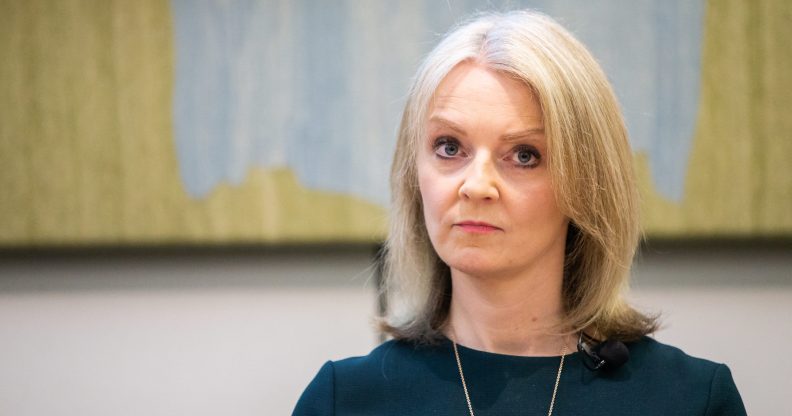Equalities minister Liz Truss suggests she’s not qualified to say whether or not the ‘new’ gender clinics are actually new

Tory MP Crispin Blunt has called for his colleague Liz Truss to be sacked as minister for women and equalities. (Luke Dray/Getty)
Conservative minister for women and equalities Liz Truss has suggested she isn’t qualified to say whether the “three new gender clinics” she promised the trans community this week are, in fact, new.
Facing MPs Thursday (September 24) about her plan to not reform the Gender Recognition Act, Truss repeated her claim the Tories are opening “three new gender identity clinics”, adding that these are “the first new clinics in the United Kingdom for 20 years”.
But when asked by Tory MP David Mundell to clarify whether these three new gender clinics are new, or whether she was referring to three pre-existing pilot schemes trailing trans healthcare in primary care and sexual health centres, Truss couldn’t answer.
Mundell asked: “Are they new clinics in addition to the pilot projects previously announced?”
Truss replied: “The clinics are new. As for whether they are the pilot clinics previously announced, those in the Department of Health and Social Care are the experts on that, but they are new clinics and they will reduce the waiting list.”
The Department of Health and Social Care – of which Truss is not a minister – was unable to give an immediate explanation when approached.
When PinkNews contacted the Government Equalities Office, a spokesperson said that there are three pilot schemes and that there are three new gender clinics, but could not provide any further clarification.
NHS England directed enquires to the Department for International Trade, which itself had not replied by time of publication.
Liz Truss’ ‘new’ clinics mean each gender clinic in England will see 15 patients a month.
Labour’s shadow minister for women and equalities, Marsha de Cordova, had already grilled Liz Truss on whether the three “new” clinics were in fact new on Wednesday (September 23), but didn’t get an answer.
She again urged Truss to clarify the matter Thursday, asking: “[Truss] failed to answer my question yesterday on whether the three new clinics mentioned in her statement were new, and we now know that they are not. What steps will the Government take to reduce the waiting times radically for people to access gender clinics?”
In response, Truss repeated: “We are opening the first new gender identity clinics in 20 years and we are committed to ensuring that transgender healthcare is improved and waiting lists are reduced.”
Truss also referred to Tuesday’s announcement, in which she committed to reducing the number of people on a waiting list for an appointment at a gender clinic by 1,600 patients by 2022.
This figure means each gender clinic in England seeing roughly 15 patients a month between now and the end of 2021. There are currently more than 13,500 trans and non-binary people waiting for an appointment at a gender clinic.
Gender dysphoria clinics versus pilot schemes: What’s the difference?
The distinction between whether Truss is opening three new gender dysphoria clinics or whether she is referring to existing pilot schemes is crucial.
There are currently only seven gender dysphoria clinics in England (they used to be called gender identity clinics, it is not clear why this has changed). Opening three new clinics would be an increase of almost 50 per cent in capacity and, though there are wide-ranging issues with the gender clinic model, would show a good commitment to addressing the crisis in trans healthcare.
But if Truss is referring to the three existing pilot schemes, then a different picture emerges. The pilots, in London, Merseyside and Manchester, are trialling offering trans people healthcare in a primary care or sexual health centre setting, and two are already up and running. They are different from gender dysphoria clinics and offer different services.
The pilot scheme in Merseyside, at Mersey Care, offers trans people a support service in the form of talking therapy. This is not the same as the healthcare available at a gender dysphoria clinic, which includes talking therapy but also hormone treatment, speech therapy, a gender-dysphoria diagnosis and the possibility of being referred for gender-affirming surgeries.
In fact, on its website, the pilot scheme at Mersey Care states very clearly that what is on offer is four hour-long therapy sessions with a counsellor, and recommends those asking to be referred there get their gender clinic referral at the same time.
In London, TransPlus at 56 Dean Street, the LGBT+ sexual-health centre, has been seeing patients all summer. It is offering trans-led healthcare, all the services available at a traditional gender dysphoria clinic and additional services like psychosexual counselling.
The London pilot is due to run for three years. If it receives a positive evaluation it may become permanent.
The Manchester trans health pilot was announced in October 2019. It, too, will take patients waiting for their first appointment at a gender dysphoria clinic and offer them healthcare in a different, more local, setting. It’s not open yet, and the range of services it will offer remains unknown.

